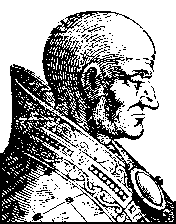 Poor Formosus was now buried in peace, but his grave must have
trembled when Sergius marched into Rome to complete the overthrow of the
usurping Christopher and take over the papacy, for Sergius was a bitter enemy of
Formosus.
Poor Formosus was now buried in peace, but his grave must have
trembled when Sergius marched into Rome to complete the overthrow of the
usurping Christopher and take over the papacy, for Sergius was a bitter enemy of
Formosus.
It is said that Formosus had consecrated Sergius bishop of Caere
to prevent him from becoming pope. Whether this was true or not, Sergius
certainly hated the memory of Formosus. Though Sergius indulged in no
resurrection-man tactics himself, he heartily approved of Stephen VII's
corpse-synod. He had an epitaph placed on Stephen's tomb which honored that
pontiff and insulted Formosus. Not content with assailing the memory of his
hated predecessor, Sergius now reversed the policy of Theodore II and John IX.
He held a synod and declared that the ordinations performed by Formosus were
invalid. This caused a tempest in the holy-water fonts throughout Italy. Bishops
and priests, who were given the choice of submitting to reordination or losing
their positions, protested angrily.
Sergius threatened to imprison any stubborn followers of
Formosus. He was a thoroughgoing party man, whose narrow policy inspired intense
bitterness. Sergius was a Roman of noble family. He had tried for the papacy in
the election which had produced John IX and had been excommunicated and exiled
by that vigorous pontiff. He had returned in triumph, at the request of the
Romans, and had succeeded the antipope Christopher. He associated himself
closely with the most powerful noble in Rome, the Duke, Commander of the Army,
and Master of the Wardrobe, Theophylactus. The family of this man will control
the papacy for decades. Sergius is even accused of having a son by Marozia, the
daughter of Theophylactus, a son who became Pope John XI.
On the other hand, there are glowing accounts of Sergius which
make such shameful goings on quite improbable. With the manuscripts available,
the just historian can scarcely convict Sergius of such misconduct. But neither
can he acquit him. Sergius seems to have been a hard-working pope, and except
for his unfortunate policy against the party of Formosus, a fairly wise one. He
showed great solicitude for the welfare of the Church by getting a number of
synods held. He defended the doctrine that the Holy Ghost proceeds from the
Father and the Son. He brought peace to Constantinople by declaring valid
Emperor Leo's fourth marriage. The other three wives were dead, but some Greeks
refused to consider a fourth marriage valid no matter how free the prospective
bridegroom.
In a material way he took steps to get help for John, archbishop
of Ravenna, against the depredations of the Count of Istria. He rebuilt the
Lateran Basilica which had crashed in ruins in 896. Sergius III died either in
April or June, 911.
Excerpted from "Popes
Through the Ages" by Joseph Brusher, S.J.

